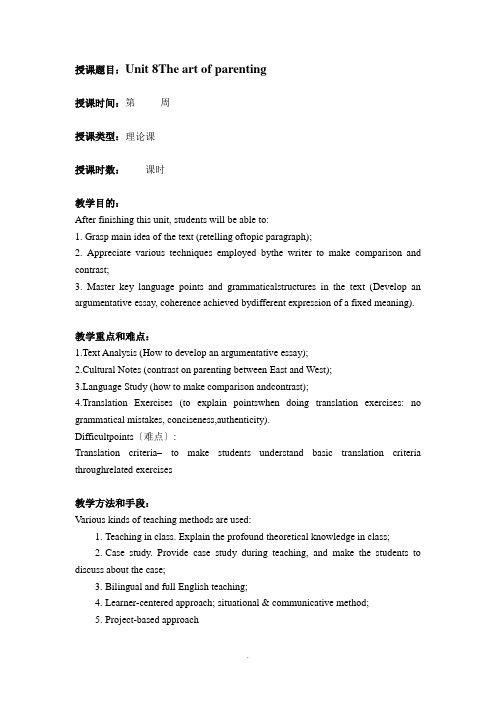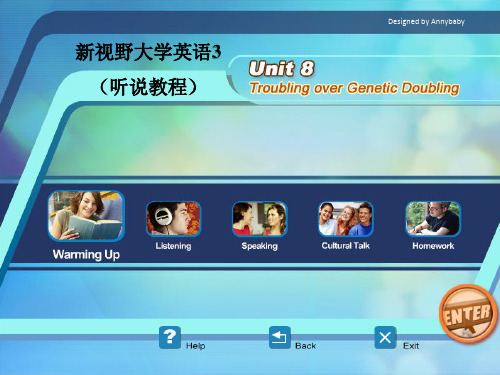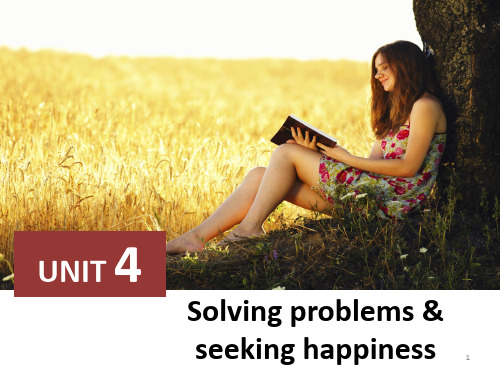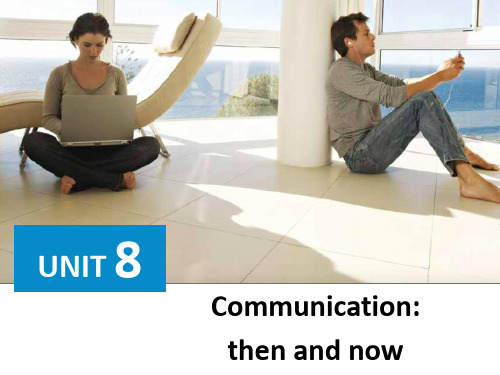新视野大学英语3 unit 8课件
- 格式:ppt
- 大小:262.00 KB
- 文档页数:31

授课题目:Unit 8The art of parenting授课时间:第_____周授课类型:理论课授课时数:____课时教学目的:After finishing this unit, students will be able to:1. Grasp main idea of the text (retelling oftopic paragraph);2. Appreciate various techniques employed bythe writer to make comparison and contrast;3. Master key language points and grammaticalstructures in the text (Develop an argumentative essay, coherence achieved bydifferent expression of a fixed meaning).教学重点和难点:1.Text Analysis (How to develop an argumentative essay);2.Cultural Notes (contrast on parenting between East and West);nguage Study (how to make comparison andcontrast);4.Translation Exercises (to explain pointswhen doing translation exercises: no grammatical mistakes, conciseness,authenticity).Difficultpoints〔难点〕:Translation criteria–to make students understand basic translation criteria throughrelated exercises教学方法和手段:Various kinds of teaching methods are used:1.Teaching in class. Explain the profound theoretical knowledge in class;2.Case study. Provide case study during teaching, and make the students to discuss about the case;3.Bilingual and full English teaching;4.Learner-centered approach; situational & communicative method;5.Project-based approach教学内容和过程:Section A Reflections of a Chinese mother in the westStep One Warming-up Activities30 minutesQ1: Is your mother a Tiger Mother? What would your parents do if you failed to meet their expectations?Yes.Assume strength rather than fragility;Be strict with me;Not permit me to do …;Physically punish me.Q2: Have you ever hated your parents when they forced you to do something you disliked but which later proved to be worthy of your efforts?Yes.Force me to learn the Chinese calligraphy;Physically punished me because of my lack ofself-discipline;Be all for my good;Better appreciate traditional culture;Foster patience and persistence;Be forever grateful for their guidance.Q3:Which teaching method is better, Chinese parenting or western parenting? Chinese patenting:obedience and discipline;focus on children’s IQ development;perfect grades;land a satisfactory job.Western parenting:freedom; a happy childhood;more encouragement;a relaxed environment;mental health.Cultural background1. What is the most popular grading system in the United States?Discrete evaluation in the form of letter grades;Follow a five-point system, using the letters A, B, C, D and F;A indicating excellent, C indicating average and F indicating failing.2. What is the core of Confucianism?Humanism, the belief that human beings are teachable, improvable and perfectible through personal and communal endeavor especially including self-cultivation and self-creation.3. What can children do in the sleep-away camps?Sleep under the stars with friends;Learn to shoot a bow and arrow;Spend entire days in their swimming suits, etc.There are all kinds of camps, and all offer opportunities for kids to engage in new skills while also immersing themselves in familiar pursuits.Step Two Text Study 80 minutesI.Interactive reading of the textMain ideas of the partsThis text is an argumentative essay. Western parents are ________________ Chinese parents’success of raising kids. (Para.1)baffled aboutWhat do Westerners think of Chinese parents’way of raising kids? (Para. 2) provocative, unimaginable and even illegalDifferences between Chinese mothers and Western parents to an obese child (Para. 2): Chinese mothersWestern parentsPart I —(Paras. 1- __)Chinese parents raise successful kids, but they use some methods which are ________________________ to Westerners.unacceptable (or different)Part II —(Paras. 3-10)It contains three sections and explains in detail what the three ideological differences are.Why do Western parents want to protect their children from criticism? (Para. 3) Children are tender and not strong;Parents should protect their children’s self-esteem and protect children against thefeeling of failure.The child comes home with a B (Paras. 4-5)Western parentsChinese parentsa screaming, hair-tearing explosionpraise the childexpress disapprovalget practice testsworry about theirchilduse every tool to get her child’s grade up to an AWhy do Chinese parents demand perfect grades? (Para. 6)Because they take it for granted that their child can get them, and grades are a more important measure of success than “self-esteem〞.the second ideological difference (Paras.7-8)Chinese parents believe their kids ______ them everything. (Para. 7)Most Westerners don’t believe their offspring must show permanent ____________ to their parents. (Para. 8)the third ideological differenceMain idea of the parts Para. 9Para. 9Third, Chinese parents believe they know what’s best for their children and therefore have ultimate _________________ their children’s desires and preferences. Chinese children have no rights to __________, which is why Chinese daughters can’t have boyfriends in highschool and there are no late curfews or trips to sleep-away camps. Also even the slightest ___________ or _____________, anything less than unquestioning obedience, is extinguished, and punished into ______________. According to Western propaganda, what are Asian mothers like? (Para.10)Which parenting method is more beneficial tochildren’s success in the future, according tothe author? (Para.11)Chinese parenting is more effective in equipping their children with skills, work habits and inner confidence for success in the future.Part III —(Para. 11)The Chinese parenting method is more __________ and __________ because it can better prepare their children for the future.Summary of the textReflections of a Chinese mother in the WestWestern parents are _________ by Chinese parents’success of raising kids. Chinese parents do things that seem provocative, unimaginable, even _________, to opinionated Westerners. There are three ideological differences between Chinese and Western parents.First, Western parents cradle their children’s ____________ to insulate them from criticism. Chinese parents assume their kid is hardy enough to take the criticism. Second, Chinese parents believe their kids ______ them everything. Most Westerners don’t believe their offspring must show permanent ____________ to their parents. Third, Chinese parents consider they know what’s best for their children and therefore have ultimate _____________ their children’s desires and preferences.Of course there is also some _______All decent parents want to do what’s best for their children. It’s the ____________ that’s different. The Chinese parenting method is more practical and _______ because it can better prepare their children for the future.Language focusPractical phrase:1. dispense with摒弃;不用〔做〕年轻人应该学会节俭,摒弃一切不必要的奢侈品。



Unit 8 testNextDirections: Click on the speaker to the left to start playing the audio recordings for Parts I, II and III. They will be played continuously. Once the recording starts playing, please do NOT click on either the speaker icon or the 'Unit Quiz' link in the menu bar above. Otherwise, you may lose the chance of hearing the complete recording.Part IDirections: Listen to the short dialogs, and then choose the correct answers to the questions. You will hear the recording twice. After the first playing, there will be time for you to choose the correct answers. Use the second playing to check your answers.1. (Listen to the audio recording for the question.)A. It is important to offer an online friend a drink.B. It is delightful to get a drink from an online friend.C. Ensure that nobody puts anything harmful into your drink.D. Be sure to shake the drink before you take it.2. (Listen to the audio recording for the question.)A. She will run as fast as she can.B. She will defend herself.C. She will be scared to death.D. She will buy a can of hairspray.3. (Listen to the audio recording for the question.)A. Her bicycle.B. Her sunglasses.C. Her cell phone.D. Her wallet.4. (Listen to the audio recording for the question.)A. Mom and son.B. Teacher and student.C. Colleagues.D. Strangers.5. (Listen to the audio recording for the question.)A. His father.B. His sister.C. His teacher.D. The woman speaker.Part IIDirections: Listen to the passage three times. When the passage is read for the first time, listen for the general idea. When the passage is read the second time, fill in the blanks numbered from S1 to S7 with the exact words you hear. For blanks numbered from S8 to S10, write down either the exact words you hear or the main points in your own words. When the passage is read the third time, check your answers.How can a teen be convinced to stop smoking—or persuaded never to take up the (1) at all?Those questions became even more (2) last week when the Center for Disease Control and Prevention reported that tobacco use (3) teenagers increased by nearly one-third in the last (4). In 1994, 27.5% of teens used cigarettes, smokeless tobacco or cigars. In 2004, 36.4% (5).Teens have their own (6), their own pressures. What works for (7) smokers may not work for adolescents.To survey the teens, the questions must be carefully phrased because "(8)", says April Roeseler, a health educator and chief of local programs for the Tobacco Control Section of the California Department of Health Services, which runs the California Smokers' Helpline. With teenagers, counselors aim to be more conversational.(9). In the next few weeks, the counselor sets up additional telephone appointments, with up to a total of eight sessions.(10), says Lester Brown, assistant professor of family and preventative medicine at the UC San Diego School of Medicine and the principal investigator for the project. Researchers want to see whether the teens who quit remain non-smokers."Things are looking promising," he says, but he could offer no success-rate figures.Part IIIDirections: Listen to the following recording, and then choose the correct answers to the questions. You will hear the recording twice. After the first playing, there will be time for you to choose the correct answers. Use the second playing to check your answers.1. Which of the following would be the best title for the passage?A. World day against child labor.B. The worst forms of child labor.C. The reasons for child labor.D. The solutions to child labor.2. About how many children are doing dangerous jobs?A. About 120 million.B. Over 180 million.C. About 250 million.D. Nearly 750 million.3. Which of the following is NOT mentioned among the worst forms of child labor?A. Illegal sex trade.B. Illegal drug trade.C. Robbery.D. Wars.4. Where are the most children forced to work?A. In Asia and Latin America.B. In Asia and Africa.C. In Africa and Latin America.D. In Asia, Africa and Latin America.5. What should be governments' first step to reduce and end child labor?A. To find out the worst forms of child labor.B. To identify the worst areas of child labor in the world.C. To punish governments that do not fight against child labor.D. To carry out special programs with time limits.Part IVDirections: Choose the best answer to each of the following statements.1. Believe me, I'll never again be a slave ____ smoking.A. atB. inC. toD. with2. It's the local youth throwing firecrackers. Don't go out. They're likely to throw one _____ you if you bother them.A. toB. atC. forD. through3. The beggars really _________. I can't help but feel sorry for them. They look so miserable.A. get to meB. get in meC. make to meD. make in me4. Someone must have made a copy of your credit card. You'll have to cancel it at once and get a new one. Hopefully, the bank will ______ the damage.A. includeB. embraceC. coverD. pay with5. My accountant is preparing my income tax ______, and I need to go over some of the receipts with her.A. turnB. returnC. payD. report6. The government just squanders our ___________ tax money on some unnecessary projects.A. hard-earnedB. hardly-earnedC. hard-earningD. hardly-earning7. Start-up companies, particularly those _______ new technology, sometimes produce huge returns to their creators and investors.A. associating withB. associated withC. associates withD. associate with8. You can't understand gambling as an addiction unless you've been _______.A. attractedB. attachedC. hookedD. booked9. _____ every student the school had in the ESL and Limited English Proficiency Program, they would receive $400.A. ToB. InC. AtD. For10. You don't have money you need to buy the equipment to be competitive. You have just _____ enough funds to cover your day-to-day operational expenses.A. merelyB. surelyC. barelyD. rarely。


Traditional Christmas shopping customs1 Once again, it's that time of year, when all good men and women settle their differences, get back in touch with old friends and loved ones, and do their utmost to enjoy some centuries-old traditions of Christmas shopping.2 At the start of the Christmas shopping season is Stir-up Sunday. This used to be a display of family unity when everyone went to the grocer's shop to buy the flour, eggs and jars of dried fruit, and then stand around the kitchen table helping Mother or Grandmother make the Christmas pudding. Each member of the family would take it in turns to stir up, or mix, the ingredients and make a secret wish.3 These days it has become the custom, just before we go to the market to order the turkey, for Mother to say, "With all your family coming for Christmas lunch, we'll need a ten-kilo turkey," and Father to reply "Ten kilos! You must be kidding! We'll have to saw it in half to getit in the oven." Then number one Son says "Why don't we have a goose this year?" and number two Son says, "What about roast duck?" and finally, number one Daughter "Stirs it Up" by saying in disgust, "But you know I don't eat any meat whatsoever, all those poor turkeys, what about us vegetarians?" It's then traditional for Father to make a wish, not a secret one but at the top of his voice, "I wish you'd eat proper food like the rest of us!"4 Then there's the custom of Buying our Overseas Relatives Presents on the Last Day of Posting. It begins like this. Someone notices that there's scarcely one day left before parcels to distant countries need to be sent. Then Mother and Father play a game calledIt's-your-side-of-the-family-not-my-side, usually until they won't speak to each other ever again (so, about five minutes). Then Father (for it's always him) rushes into town in a panic to buy something like socks or a tea towel, nothing too heavy because of the postage costs, and definitely not the same present as he bought last year.5 Another tradition is Hunt the Parking Space. This involves the annual triumph of hope against experience—taking the car into town to go Christmas shopping. Traditionally, Father will steer the car round and round the parking lots, watching for some Merry Christmas shopper staggering past with bags and presents, and then following them, like the Three Wise Men following the star 2,000 years ago, until they leadthe family to their parking place.6 At Christmas on street corners in British and American cities, you'll find the brass band of the local Salvation Army playing Christmas music to the shoppers. Mothers and fathers, sons and daughters stop to listen to some of the season's best-loved songs. Then one of the Salvation Army soldiers takes out a collecting box, asking those around for a donation to buy gifts for the less fortunate members of the community. At this point, Father will collect his bags, and start to walk quickly away, signalling to the children to follow. This is the old tradition of Father Not Having any Spare Change, and is usually accompanied by the words, "Come along, children, God will provide!" as he "pretends" to vanish without paying.7 Perhaps the best-loved Christmas custom is Buying the Christmas Tree. This is traditionally left until the very last moment, long after all the good trees have disappeared. Mother reminds Father that the family needs a tree, Father replies that Christmas trees are a waste of money, and the children start to cry. So Father goes into town by bus, because the traffic is awful, and buys the last tree, traditionally the smallest tree possible, with the most peculiar shape, from a man on a street corner who demands a traditional Excessive Payment "because it's Christmas". Father then utters the words, "The price of trees ... it's an absolute scandal," hands over large numbers of bank notes, and proceeds to bring the tree home somehow. When the bus driver sees Father with the tree, trying to get on a bus which is packed stiff with shoppers, he greets him with the words, "You can't get on here with that!"8 The final tradition is Collecting the Turkey. After everyone has bought all their presents, wrapped them and stored them under the Christmas tree, it's time to force their way back into town, through crowded streets, carol singers and bell-ringers, wrapping paper salesmen, past Father Christmas going ho ho ho, office workers on the way home drunk, young women wearing Santa's little helper hats, and venture into the market. As day turns slowly to night, the shop lights come on, the Christmas music plays at top volume, and the family makes its way to the butcher's shop. Hanging high above the crowds are vast sides of red beef, deer without their heads, rabbits still in their fur socks, pink-looking pigs and of course, the turkeys. At this point, in a tradition which is an echo of Stir-up Sunday, number one Daughter has to say in disgust, "Oh, it's so gross! I can't believe you'd ever eat all that meat!"9 Happy Christmas Shopping!传统的圣诞购物习俗又是圣诞节了,所有的善男信女都该放下他们的分歧,重新与老朋友和心爱的人联系,尽情享受几百年来的圣诞节购物传统了。
Unit 8 test Next Direc ons: Click on the speaker to the le to start playing the audio recordings for Parts I, II and III. They will be played con nuously. Once the recording starts playing, please do NOT click on either the speaker icon or the 'Unit Quiz' link in the menu bar above. Otherwise, you may lose the chance of hearing the complete recording. Part I Direc ons: Listen to the short dialogs, and then choose the correct answers to the ques ons. You will hear the recording recording twice. twice. twice. A er A er A er the the first first playing, playing, playing, there there there will will be me me for for for you you you to to to choose choose choose the the correct answers. Use the second playing to check your answers. 1. (Listen to the audio recording for the ques on.) A. It is important to offer an online friend a drink. B. It is deligh ul to get a drink from an online friend. C. Ensure that nobody puts anything harmful into your drink. D. Be sure to shake the drink before you take it. 2. (Listen to the audio recording for the ques on.) A. She will run as fast as she can. B. She will defend herself. C. She will be scared to death. D. She will buy a can of hairspray. 3. (Listen to the audio recording for the ques on.) A. Her bicycle. B. Her sunglasses. C. Her cell phone. D. Her wallet. 4. (Listen to the audio recording for the ques on.) A. Mom and son. B. Teacher and student. C. Colleagues. D. Strangers. 5. (Listen to the audio recording for the ques on.) A. His father. B. His sister. C. His teacher. D. The woman speaker. Part II Direc ons: Listen to the passage three mes. When the passage is read for the first me, listen for the general idea. When the passage is read the second me, fill in the blanks numbered from S1 to S7 with the exact words you hear. For blanks numbered from S8 to S10, write down either the exact words you hear or the main points in your own words. When the passage is read the third me, check your answers. How can a teen be convinced to stop smoking —or persuaded never to take up the (1) at all? Those Those ques ons ques ons ques ons became became became even even even more more more (2) (2) (2) last last last week week week when when when the the the Center Center Center for for for Disease Disease Disease Control Control Control and and Preven on reported that tobacco use (3) teenagers increased by nearly one-third in the last (4). In 1994, 27.5% of teens used cigare es, smokeless tobacco or cigars. In 2004, 36.4% (5). Teens Teens have have have their their their own own (6), their own pressures. pressures. What What works works for for for (7) (7) smokers smokers may may may not not work work for for adolescents. To survey the teens, the ques ons must be carefully phrased because "(8)", says April Roeseler, a health health educator educator educator and and and chief chief chief of of of local local local programs programs programs for for for the the the Tobacco Tobacco Tobacco Control Control Control Sec on Sec on Sec on of of of the the the California California Department Department of of of Health Health Health Services, Services, Services, which which which runs runs runs the the the California California California Smokers' Smokers' Smokers' Helpline. Helpline. Helpline. With With With teenagers, teenagers, counselors aim to be more conversa onal. (9). In the next few weeks, the counselor sets up addi onal telephone appointments, with up to a total of eight sessions. (10), says Lester Brown, assistant professor of family and preventa ve medicine at the UC San Diego School of Medicine and the principal inves gator for the project. Researchers want to see whether the teens who quit remain non-smokers. "Things are looking promising," he says, but he could offer no success-rate figures. Part III Direc ons: Direc ons: Listen Listen Listen to to to the the the following following following recording, recording, recording, and and and then then then choose choose choose the the the correct correct correct answers answers answers to to to the the ques ons. You will hear the recording twice. A er the first playing, there will be me for you to choose the correct answers. Use the second playing to check your answers. 1. Which of the following would be the best tle for the passage? A. World day against child labor. B. The worst forms of child labor. C. The reasons for child labor. D. The solu ons to child labor. 2. About how many children are doing dangerous jobs? A. About 120 million. B. Over 180 million. C. About 250 million. D. Nearly 750 million. 3. Which of the following is NOT men oned among the worst forms of child labor? A. Illegal sex trade. B. Illegal drug trade. C. Robbery. D. Wars. 4. Where are the most children forced to work? A. In Asia and La n America. B. In Asia and Africa. C. In Africa and La n America. D. In Asia, Africa and La n America. 5. What should be governments' first step to reduce and end child labor? A. To find out the worst forms of child labor. B. To iden fy the worst areas of child labor in the world. C. To punish governments that do not fight against child labor. D. To carry out special programs with me limits. Part IV Direc ons: Choose the best answer to each of the following statements. 1. Believe me, I'll never again be a slave ____ smoking. A. at B. in C. to D. with 2. It's the local youth throwing firecrackers. Don't go out. They're likely to throw one _____ you if you bother them. A. to B. at C. for D. through 3. The beggars really _________. I can't help but feel sorry for them. They look so miserable. A. get to me B. get in me C. make to me D. make in me 4. Someone must have made a copy of your credit card. You'll have to cancel it at once and get a new one. Hopefully, the bank will ______ the damage. A. include B. embrace C. cover D. pay with 5. My accountant is preparing my income tax ______, and I need to go over some of the receipts with her. A. turn B. return C. pay D. report 6. The government just squanders our ___________ tax money on some unnecessary projects. A. hard-earned B. hardly-earned C. hard-earning D. hardly-earning 7. 7. Start-up Start-up Start-up companies, companies, companies, par cularly par cularly par cularly those those those _______ _______ _______ new new new technology, technology, technology, some mes some mes some mes produce produce produce huge huge returns to their creators and investors. A. associa ng with B. associated with C. associates with D. associate with 8. You can't understand gambling as an addic on unless you've been _______. A. a racted B. a ached C. hooked D. booked 9. _____ every student the school had in the ESL and Limited English Proficiency Program, they would receive $400. A. To B. In C. At D. For 10. You don't have money you need to buy the equipment to be compe ve. You have just _____ enough funds to cover your day-to-day opera onal expenses. A. merely B. surely C. barely D. rarely 。